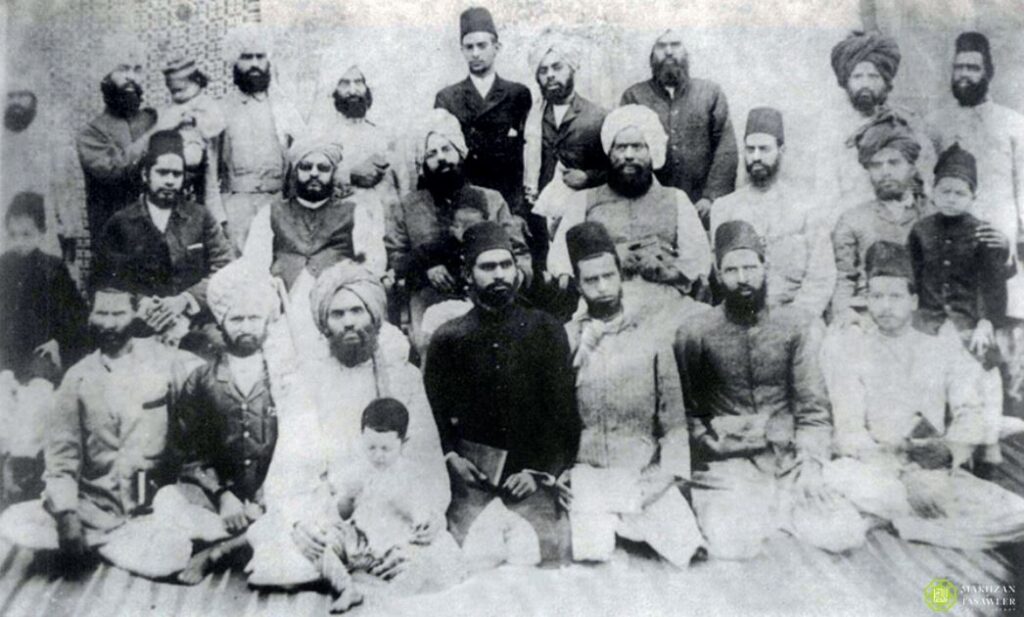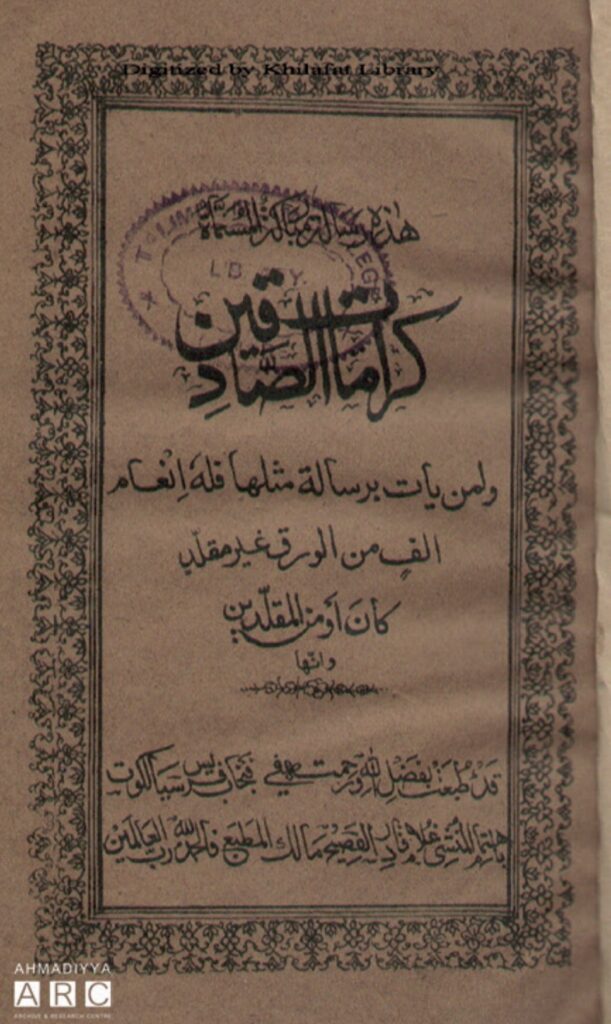
The opponents of the Promised Messiah and Mahdi, Hazrat Mirza Ghulam Ahmadas, submit that he started writing poetry and prose in Arabic from 1893 and in their view, it was not because Allah had taught him Arabic in one night; rather, in that year Hazrat Hakim Maulvi Nuruddinra, who was well-versed in Arabic, permanently settled in Qadian.
According to opponents of the Jamaat, an Arabic qaseedah [ode] composed by Hazrat Maulvi Nuruddinra possesses a resemblance with a qaseedah written by Hazrat Mirza Ghulam Ahmadas at the end of his Arabic book, Karamat-us-Sadiqin. They consider this sufficient proof to proclaim that the real author of all the Arabic works of the Promised Messiahas was Hazrat Hakim Maulvi Nuruddinra.

This objection that the Promised Messiahas did not know or have much command over the Arabic language and Hazrat Maulvi Nuruddinra used to write Arabic books for him is not a new allegation. These accusations have been raised against the prophets of God the Almighty in the past as well and the Holy Quran also sheds light on them.
Allah the Almighty states:
اَنّٰی لَہُمُ الذِّکۡرٰی وَ قَدۡ جَآءَہُمۡ رَسُوۡلٌ مُّبِیۡنٌ۔ ثُمَّ تَوَلَّوۡا عَنۡہُ وَ قَالُوۡا مُعَلَّمٌ مَّجۡنُوۡنٌ
“How can they benefit by admonition, when there has already come to them a Messenger, explaining things clearly, and yet they turned away from him and said: ‘He is tutored, a man possessed’?” (Surah al-Dukhan, Ch.44: V.14-15)
At another place in the Holy Quran, Allah says:
وَ قَالَ الَّذِیۡنَ کَفَرُوۡۤا اِنۡ ہٰذَاۤ اِلَّاۤ اِفۡکُ ۣافۡتَرٰٮہُ وَ اَعَانَہٗ عَلَیۡہِ قَوۡمٌ اٰخَرُوۡنَ ۚۛ فَقَدۡ جَآءُوۡ ظُلۡمًا وَّ زُوۡرًا
“And those who disbelieve say, ‘It is naught but a lie which he has forged, and other people have helped him with it.’ Indeed, they have brought forth an injustice and an untruth.” (Surah al-Furqan, Ch.25: V.5)
When the Holy Quran was revealed to the Holy Prophet, peace and blessings of Allah be upon him, the idol worshipers of Mecca, hearing this Divine word, said that a Hebrew slave had been teaching him and he was only spreading his teachings. This incident is also mentioned in the Holy Quran. Allah the Almighty says:
وَ لَقَدۡ نَعۡلَمُ اَنَّہُمۡ یَقُوۡلُوۡنَ اِنَّمَا یُعَلِّمُہٗ بَشَرٌ ؕ لِسَانُ الَّذِیۡ یُلۡحِدُوۡنَ اِلَیۡہِ اَعۡجَمِیٌّ وَّ ہٰذَا لِسَانٌ عَرَبِیٌّ مُّبِیۡنٌ
“And indeed We know that they say that it is only a man who teaches him. But the tongue of him to whom they unjustly incline in making this insinuation is foreign, while this is Arabic tongue, plain and clear.” (Surah al-Nahl, Ch.16: V.104)
Thus, apparently, the opponents are denying the Promised Messiahas, but by raising this objection, they are basically adopting the sunnah [practice] of the enemies of the prophets and in fact, bearing witness to the authenticity of the Prophet of Allah, Hazrat Mirza Ghulam Ahmadas. As God the Almighty says:
وَ جَحَدُوۡا بِہَا وَ اسۡتَیۡقَنَتۡہَاۤ اَنۡفُسُہُمۡ ظُلۡمًا وَّ عُلُوًّا ؕ فَانۡظُرۡ کَیۡفَ کَانَ عَاقِبَۃُ الۡمُفۡسِدِیۡنَ
“And they rejected them wrongfully and arrogantly, while their souls were convinced of them. See then, how evil was the end of those who acted corruptly!” (Surah al-Naml, Ch.27: V.15)
Hence, the above verses indicate that the opponents cannot tarnish the holy personage of the Promised Messiahas by concocting the said allegation, but according to the words of God Himself:
بَلۡ قَالُوۡا مِثۡلَ مَا قَالَ الۡاَوَّلُوۡنَ
“But they say like what the former people said” (Surah al-Muminun, Ch.23: V.82), the opponents have testified to the truthfulness of the Promised Messiahas and followed the example of earlier foes of prophets. Regarding such enemies of prophets, Allah the Almighty declares:
تَشَابَہَتۡ قُلُوۡبُہُمۡ
“Their hearts are alike.” (Surah al-Baqarah, Ch.2: V.119)
Below is the claim of the Promised Messiahas regarding the Arabic poems and couplets to which the opponents object:
اُنظُرْ إلٰی أقوالہم وتنـاقُضٍ
سَـلَب العنـادُ إصابۃ الآراء
“Ponder over their words and the contradictions within them; enmity has taken away the honest opinion from them.”
طَـورًا إلی عـربٍ عـزَوہ وتارۃ
قالوا کلام فاسد الإمـلاء
“At times, they attributed my work to an Arab and on other occasions, they said that the diction of this work is bad.”
ھٰذا مِنَ الرّحمٰن یا حزبَ العِدا
لا فِعْل شامیٍّ ولا رفقـائی
“O enemies! This is the [work] of the Most Gracious God. This is neither the work of a Syrian, nor the act of any of my companions.” (Anjam-e-Atham, Ruhani Khazain, Vol. 11, p. 275)
Replying to the question as to whose verses these are, the Promised Messiahas said:
“My opponents are certainly rightful in thinking that this is not his [the Promised Messiah’sas] work and that someone else secretly helps him. Thus, I solemnly declare that indeed, there is another [Entity] Who helps me, but He is not a human being; rather, He is that Omnipotent God Almighty on Whose threshold our head [prostrates].” (Ijaz-ul-Masih, Ruhani Khazain, Vol. 18, p. 2)
The Arabic books of the Promised Messiahas consist of more than 2,200 pages and the total number of Arabic couplets is more than 3,500. Beyond any doubt, all these works of Arabic belong to the Promised Messiahas. The Promised Messiahas has openly declared his Arabic poems, essays and writings as a miracle from God. That is, the Promised Messiahas has attributed his Arabic works to Allah the Almighty.
Now imagine, if he was lying about this and falsely attributing all these works to Allah, which, according to the opponents, was written by Hazrat Maulvi Nuruddinra, then (God forbid) the Promised Messiahas deserved the punishment mentioned in the Holy Quran. Allah the Almighty states:
وَ لَوۡ تَقَوَّلَ عَلَیۡنَا بَعۡضَ الۡاَقَاوِیۡلِ۔ لَاَخَذۡنَا مِنۡہُ بِالۡیَمِیۡنِ۔ ثُمَّ لَقَطَعۡنَا مِنۡہُ الۡوَتِیۡنَ
“And if he had forged and attributed any sayings to Us, We would surely have seized him by the right hand, and then surely We would have severed his lifeartery.” (Surah al-Haaqah, Ch.69: V.45-47)
In the above verse, God the Almighty refers to the Holy Prophetsa and says that if this claimant of prophethood had attributed something to Him falsely, Allah would have seized him with His right hand and cut his jugular vein. However, God Almighty did not do so and it is a proof that Prophet Muhammadsa of Arabia was a true prophet of Allah.
Hence, this is the criterion of the authenticity of all prophets, that whoever falsely attributes a statement to God is surely punished by Him and annihilated. Allah the Almighty says:
وَ قَدۡ خَابَ مَنِ افۡتَرٰی
“And surely, he who forges a lie [against Allah] shall perish.” (Surah Ta Ha, Ch.20: V.62)
وَ مَنۡ اَظۡلَمُ مِمَّنِ افۡتَرٰی عَلَی اللّٰہِ کَذِبًا اَوۡ کَذَّبَ بِاٰیٰتِہٖ ؕ اِنَّہٗ لَا یُفۡلِحُ الظّٰلِمُوۡنَ
“And who is more unjust than he who forges a lie against Allah or gives the lie to His Signs? Surely, the unjust shall not prosper.” (Surah al-An‘am, Ch.6: V.22)
However, if a claimant of prophethood is not subjected to such severe punishment by Allah aft er attributing a statement to Him, then he is surely a true prophet.
In the same way, the Promised Messiahas attributed the miracle of his Arabic to God and then he did not receive the said punishment from Him and on the contrary, he was granted immense rewards and blessings from Allah. This substantiates that the Promised Messiahas was right and his claims were unquestionably true.
In addition to the above mentioned argument, the challenge of the Promised Messiahas to the scholars of India and Arabia also supports his claim. He challenged them to compete with him in Arabic writing, but to date, no one has dared to accept it.
Hence, if a person had learnt Arabic like the Promised Messiahas or written extraordinary Arabic verses with the help of another person, then they should have at least stepped up to his challenge. Thus, it is our right to say that all Arab and non-Arab opponents have confirmed through their own actions that Hazrat Mirza Ghulam Ahmadas was indeed truthful.
Let us suppose that the said Arabic verses were written by someone else and the Promised Messiahas published them under his own name and no Arab or non-Arab was able to compose better or even equally qualitative work, then if not the Promised Messiahas, the opponents ought to acknowledge the person who was granted the miracle of excellence in Arabic language by Allah.
Beyond a shadow of a doubt, the Promised Messiahas was taught Arabic by Allah and the position of Jamaat-e-Ahmadiyya in this regard is clear. The Arabic that the Promised Messiahas knew before he was divinely taught was the same Arabic language that was taught in the madrasas [schools] of his time.
At that time, some books of sarf wa nahw [principles of grammar], part of Diwan-e-Hamasa, Diwan-e-Mutanabbi, the seven Mu‘allaqat and some chapters of Maqamat-e-Hariri were taught in madrasas and this continues to be the case even today. If someone could have written powerful and expressive books in Arabic by reading the said course, then it was read by every cleric at that time, so why was a single scholar unable to compete in that era and accept the challenge of the Promised Messiahas?
Hence, if the Promised Messiahas was aware that Allah the Almighty did not teach him Arabic through divine revelation, he would neither have challenged any scholar of his age to compete with him in Arabic, nor would he have set monetary rewards for his opponents.
On the other hand, had the Promised Messiahas made a false claim, Allah the Almighty would have surely stimulated the hearts of dozens, if not hundreds of thousands, of opponents against him to prove his lie to the world and they would certainly have written better and far more impressive books in Arabic.
However, God Almighty did not help any Arab or non-Arab scholar against him and proved that the claim of the Promised Messiahas was true. Allah the Almighty supported him and his opponents were deprived of divine help. Many of the opponents of the Promised Messiahas were/are Arabs by birth and well-renowned experts in theology, but even they could not find the courage to accept his challenge.
Thus, Allah the Almighty helped the Messiahas of Muhammadsa to prevail over all the clerics and religious scholars of his age, and they were not able to prove the Promised Messiahas as false, as Allah the Almighty says:
اَمۡ یَقُوۡلُوۡنَ تَقَوَّلَہٗ ۚ بَلۡ لَّا یُؤۡمِنُوۡنَ۔ فَلۡیَاۡتُوۡا بِحَدِیۡثٍ مِّثۡلِہٖۤ اِنۡ کَانُوۡا صٰدِقِیۡنَ
“Do they say, ‘He has fabricated it’? Nay, but they would not believe. Let them, then, bring forth a narration like this, if they speak the truth!” (Surah al-Tur, Ch.52: V.34-35)


MashAllah Amazing Article. The Khutba Ilhamiya or the Revealed Sermon also testifies to the truth of the Promised Messiah (as) and his being taught Arabic by God.
It was actually in response to these allegations that Allah revealed the sermon to him completely and exclusively in Arabic, and thus showed the world that the support of Allah is with him.